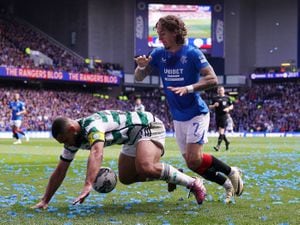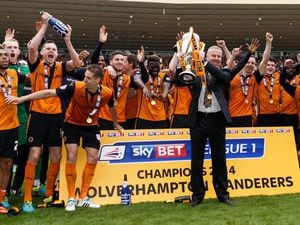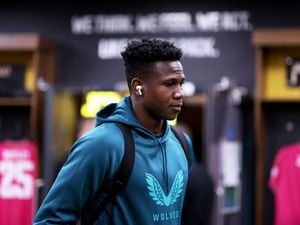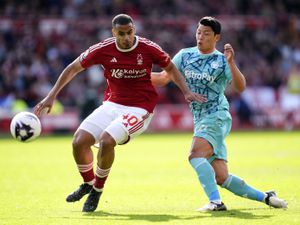When Wolves were saved by the Bell!
For the all-conquering Liverpool side of the 1980s, it was David Fairclough.
For Manchester United, in the 1990s and 2000s, Ole Gunnar Solskjaer.
In even more recent times, it has been Jermain Defoe.
And for Wolves, back in the day, Norman Bell.
The supersub. That player, usually a striker, who could come off the bench and make things happen, deliver a positive impact.
Bell’s prolific purple patch in that respect came particularly to the fore during Wolves’ run to an FA Cup semi- final with Tottenham in 1980/81.
There are highlights on YouTube of the fifth-round tie at home to Wrexham, then a division below Wolves, where Bell strides on to a hero’s reception with his team 1-0 down and little over 20 minutes remaining.
Almost immediately he latches onto a John Richards header to smash home the equaliser and barely minutes later capitalises on battling work from Andy Gray to notch his second.
Richards added a late third and Wolves were through to the FA Cup quarter finals for the fourth time in five seasons, where Bell repeated the trick in the replay against Middlesbrough by coming on to score in another 3-1 victory.
Particularly special for a lad from Sunderland!
Of Bell’s 100 first team appearances for Wolves, 28 were as a substitute.
Of his 24 goals, five, over 20 per cent, arrived after coming off the bench.
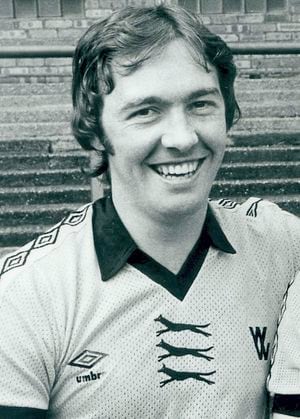
So, to the question of being hailed as a super-sub? Somewhat bitter-sweet, with the thrill of being able to make an impression and a potential matchwinner balanced with the desire and belief of wanting to be involved from the off.
The quality of the providers of those assists against Wrexham, Richards and Gray, perhaps explain why a regular starting berth for any other forward at Molineux at the time was so tricky.
Wolves boasted some excellent strikers during Bell’s eight years at the club.
“From when I arrived at Wolves and going forward, we always had a fairly big squad with a lot of good players, and a lot of good strikers,” he recalls.
“As well as John and Andy, there was Derek Dougan, Jim McCalliog, Hughie Curran, Peter Eastoe, Peter Withe, Alan Sunderland.”
Bell pauses for breath.
“And then Bobby Gould came back, Billy Rafferty, Steve Kindon – I have probably missed someone out but we would often have a squad of around 40 first team players, always with good strikers.
“So just being able to get myself into the team was always an achievement.
“Being called a supersub? I don’t think any player would ever tell you they prefer to be a substitute than be in the team.
“I desperately wanted to be in that starting eleven every single game but to be in that 12, with all those players at the club and others not even involved with their noses out of joint, I always felt a part of it.
“And when you are a sub, when you go on you just want to make a difference.
“That is always what I aimed to do, each and every time.”
Bell’s debut for Wolves actually came from the start, in a repeat of the fixture next up for the current Molineux crop a week on Saturday, at home to Aston Villa.
“I don’t remember much about the game, but obviously it was a local derby and I remember it being a full house,” he recalls.
“I then came off the bench in a game at Liverpool but my next start was a couple of months later, at Norwich, when I scored a header from 20 yards.
“That one does stick in the mind because the game was on the old ATV Star Soccer programme, and they used the goal in their titles for the show for a couple of years afterwards.”
Bell’s debut came at the age of 19, having checked in at Wolves as an apprentice three years earlier.
Born and brought up in Wearside, both Sunderland and Newcastle were interested in his signature and would welcome him in for training during the school holidays.
But Bell was also playing at Under-18 level for Hylton Colliery Welfare, where team-mate Alan Niven had already been spotted by Wolves’ chief scout Joe Gardiner.
Whilst checking on Niven, scouts then became aware of Bell, and invited him to Wolverhampton for a week’s training.
“In all honesty I was treated so much better at Wolves than other clubs, and from that first week I loved it,” Bell explains.
“As a Sunderland fan it was a big step to take, but Wolves was my choice and I joined as an apprentice.
“It was pretty tough having to leave home for the first time but I had set my heart on a career in football and if this is what it was going to take then I wasn’t going to step back from it.”
Bell settled well, initially in digs a couple of miles from the City Centre before then moving into his own place and soon marrying wife Susan.
On the pitch too, amid that intense competition for places, he enjoyed several runs in the team and showed his worth as a powerful front man who could link play and work well in a partnership as well as chipping in with a decent one-in-three strike-rate himself.
There are fond memories of travelling into Molineux and then on the coach to train at Dunstall Park Racecourse before the full-on switch to Castlecroft after John Barnwell came in, as well as afternoon finishing sessions working with goalkeeper Phil ‘Lofty’ Parkes at West Park.
“That was proper jumpers for goalposts stuff,” adds Bell.
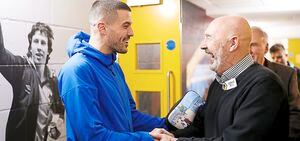
He learned not just from that impressive list of strikers, but all the experience, including managers Bill McGarry, Sammy Chung and Barnwell, and the latter’s assistant Richie Barker.
Even when playing in the reserves, featuring alongside Dave Wagstaffe as he came to the end of his Wolves career, was an education.
A spell out in America with New England Tea Men whilst recovering from injury also saw Bell working with former Manchester United forward and later renowned coach Dennis Viollet, as well as Noel Cantwell.
And injuries, perhaps more than the supersub tag, is what afflicted Bell most during his Molineux career.
Twice he broke his leg, initially in an FA Cup tie at Crystal Palace when he had to stay in a London hospital complete in Wolves kit with Derek Parkin knocking the door of the family home in the early hours to drop off his other clothing.
He also broke his wrist in an end-of-season tournament played on a redgra pitch in Gibraltar after a lively battle with Sheffield United defender Eddie Colquhoun.
That not only limited his impact in the promotion-winning 1976/77 campaign to just one appearance as an unused substitute but also meant he needed to get married in a plastercast!
He also fractured his toe in a game against Leeds – sounds like a precursor to last Friday’s feisty clash at Molineux! – but had to play on for almost 80 minutes as Kenny Hibbitt had already been substituted due to injury.
And it was only injury which ended his career at the age of 28 when after leaving Wolves for Blackburn, making a further 60 appearances, he damaged his cruciate knee ligaments in an era when that particular diagnosis spelt pretty much the end for any footballer.
“The number of injuries I got, that is definitely my biggest regret from Wolves,” Bell confirms.
“Whenever I reached a stage where I was competing for a regular place and had a decent run in the side something seemed to happen to keep me out for a while.
“So many problems seemed to come along to stop me playing, and that is my only real regret from my time at Wolves.”
There were plenty of highs to accompany the injury-influenced lows.
Not just the 1980/81 cup run but also many other goals, including in a fantastic 4-1 win over then champions Liverpool and against Aston Villa in a 3-1 victory in the days building up to the 1980 League Cup final, which was to prove Wolves’ last in that particular derby fixture for 18 games, spanning 31 years.
Therein, with Wolves’ last major trophy secured against Nottingham Forest, lies another story.
A much-told story which has previously been told from a different perspective.
Leading up to the final, Gray was due to serve a one-game suspension, and Wolves were scheduled to face Villa in a rearranged league game which would have allowed the talisman to be eligible to face Forest.
However, Villa had an FA Cup tie at West Ham which, had it gone to a replay, would have taken precedence over the Wolves game, meaning Gray’s suspension would carry over to the cup final.
It wasn’t until very late in the game – Hammer time perhaps - that Ray Stewart converted a penalty to secure victory, avoid the draw, and leave Gray available to go and notch the winning goal at Wembley.
But the flipside? Had he not been available, it would probably have been Bell partnering Richards up top.
“I’d just come back into the squad having not been involved during the season and, being a bit selfish and being desperate to make the final, remember listening to that Villa game on the radio,” says Bell.
“West Ham got the late goal, and so I played against Villa, and we put in a great performance to win the game.
“It meant Andy was available for the final, and he went on to get the winner, but Barney (Barnwell) was very good with me to be honest.
“He really didn’t need to justify anything but he pulled me in the build-up to the game and said he had been considering me as substitute but needed cover for Emlyn Hughes who had been struggling a bit.
“Colin Brazier could play not just at centre half but also at full back, in midfield, even up front if needed.
“So, Colin got the number 12 shirt, but I still really enjoyed being away with the team in the week up to the game and being there on the day – it was a great experience.”
Bell did eventually move on, halfway home to Lancashire with Blackburn but, on reflection, does wonder whether he should have dug in, stayed at Molineux and been part of the team which would go on and get promoted after the relegation during the season he left.
“The club were desperate for money and really keen to sell me although the year before they had turned down a really good offer from Millwall,” Bell reveals.
“I thought in the circumstances I may as well go, but I wouldn’t say I wanted to go or was itching to go.
“If I had stayed maybe I could have been part of the promotion campaign the season after?
“I often wonder about that, did I make a mistake?
“Having said all that, I got to move to a lovely club in Blackburn, to an area where I still really enjoy living now, so it all worked out o-k in the end.”
It did indeed, and from his now current North-West roots, Bell originally became player-manager of non-league Darwen before moving into a new chapter of non-football employment, chiefly sales-related and initially in insurance.
Transferring his footballing mentality – “if you don’t work hard, you don’t achieve anything” – he quickly made it a success with several different employers, eventually buying the bathroom accessories part of a business he had previously worked for and taking it on as his own.
After his two sons Norman and Andrew had completed school, Bell was considering retirement but knew, financially, it probably wasn’t an option.
And then, one of those chance meetings on a footballing touchline, paved the way for a very rewarding move which eventually saw Bell and Andrew – who played league football with Wycombe and also spent several years with Hednesford Town - set up a charity.
“I was involved in coaching junior football and one day a fella on the touchline asked me what I was doing now and whether I had ever thought of working in children’s homes,” Bell explains.
“It was about using football and sport as a way to engage young people who were in care and had maybe had problems with offending or had been homeless.
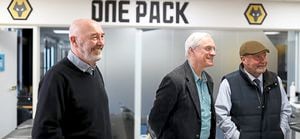
“I started working with the Offending team at Blackburn with Darwen Council, and it was going really well until the government pulled all the finances and the money that had been invested.
“It was such an important project that we felt it needed to carry on, and so we started our own charity – the Opportunity Sports Foundation.
“Obviously football was something both myself and Andrew knew a lot about and we had plenty of contacts to employ people from education and coaches who could come and get experience whilst also going through their badges.
“It is the engagement which is the most important thing, because education, for whatever reason, has failed these young people.
“Whether it is us that fails them, or it is down to circumstances or their decisions, they are thrown on the scrapheap at a very early age.
“If they are messing about at school it might be they are struggling due to other issues, maybe family problems, they might be dyslexic or have other things going on in their lives.
“If you tell them enough times that they are useless and not going to achieve anything they will start believing it and will respond accordingly.
“Sport is an amazing way to get them engaged and interested in something positive, it is a real leveller in society and it has been fantastic to see the difference it has made to so many young people.
“One lad, who is now 26, has just become a Dad with his partner, is renting a house, holding down a job and getting into management.
“He was in care, didn’t do well at all academically, but with a bit of help and pushing in the right direction has been able to show that he has the ability to succeed – he just needed a chance.
“There are so many examples which show just how positive a force sport can be in making a difference.”
Bell is not involved with the charity so much anymore - Andrew is now full-time as chief executive - but he is about to dip his toes into a new project involving football with a group of young people who have experienced homelessness.
He may even, at 66 years young, dust off the boots and get back on the pitch himself!
Away from that he is enjoying family life which includes the joys of three grandchildren Sienna, Lila and new addition Rory, ‘has a bit of garden to go at’ at his house next to a river, where he also partakes in a spot of fishing.
Bell is also delighted in recent years to have renewed acquaintances with so many of his former Wolves team-mates with whom he shared such fond memories over four decades ago.
In its formative years, Wolves Former Players Association was only open to players who had made 200 appearances, then it was reduced to 100 – allowing Bell to creep in at the far post – and now welcomes anyone who turned out in the gold and black.
That has seen Bell travel with the likes of Gerry Farrell and Paul Walker to attend events such as golf days and dinners and, only last week, was able to savour a wonderful afternoon at Wolves’ Compton training ground as the former players were guests of the club.
“It was brilliant to once again meet up with the lads and have such a great tour of the training ground,” he says.
“I was chatting with John (Richards) and Hibby (Hibbitt) about how fabulous the facilities are – the whole complex is different class.
“All the equipment they now have to help injured players with the gym, cryotherapy chamber, the running machines which take your body weight whilst you recover, the analysts who we spent some time with who have so many details on everything – it’s a different world to our day.
“For me the biggest thing was probably the quality of the pitches at the training ground, they are absolutely magnificent.
“Just in general, getting back in touch with the lads over the last few years has been really enjoyable, even during that trip just chatting to Mel Eves over the table about some of the daft things Colin Brazier used to say, it’s brilliant.
“Even 40 years on, we remember the fun we had, the memories we shared as players, and meeting up again just brings it all back as if it was yesterday.”
Those memories are certainly positive for a player and personality who always gave his all for Wolves and who’s to say what further impact he might have made had the injury provision of the modern day been around during his time.
All of Bell’s league appearances at Wolves came in the top division, and while those cameos from the bench should not define his overall contribution, they provide a lasting and positive footnote to his Molineux story.
Because when the Bell rang for Norman, more often than not, he answered the call.


